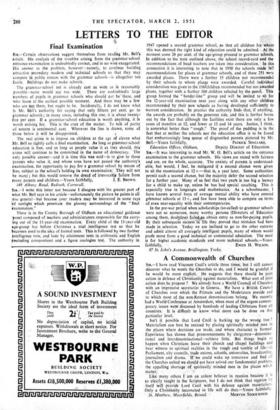A Commonwealth of Churches
SIR.-1 have read Viscount Cecil's article three times, but I still cannot discover what he wants the Churches to do, and I would be grateful if he would be more explicit. He suggests that there should be joint action in defence of Christianity against materialism. What sort of joint action does he propose ? We already have a World Council of Churches with an impressive secretariat in Geneva. We have a British Council of Churches over which the Primate and the Moderators preside and to which most of the non-Roman denominations belong. We recently had a World Conference at Amsterdam, when most of the urgent contem- porary issues were discussed by hundreds of leading Christians from all countries. It is difficult to know what more can be done on this particular level. Isn't it possible that Lord Cecil is barking up the wrong tree ? Materialism can best be misted by placing spiritually minded men in the places where decisions are made, and where character is formed. Experience has shown that Pronouncements by clergymen—denomina- tional and interdenominational—achieve little. But things begin to happen when Christians leave their church and chapel, buildings and bear witness to spiritual realities in the rough and tumble of life—in Parliament, city councils, trade unions, schools, universities, broadcasting. journalism and drama. 'If we could wake up tomorrow and find all the Churches united we should not have solved our fundamental problem. the appalling shortage of spiritually minded men in the places which matter. Like many others I am an ardent believer in reunion because it is so clearly taught in the Scriptures, but I do not think that reanion bY itself will provide Lord Cecil with his defence against materialism. Only a Christianity incarnated in life will do that.—Yours faithfully.


































 Previous page
Previous page